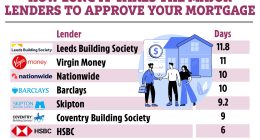THOUSANDS of hard-up households can still claim thousands of pounds for unfair charges, even as a change to banking rules has already saved Brits £1billion.
It comes after the financial regulator banned banks from charging rip-off overdraft fees back in April 2020.
Before the Financial Conduct Authority (FCA) changed the rules, banks could charge a range of overdraft fees including daily and monthly charges, as well as interest making it hard for people to understand how much they were being charged.
For example, customers could find that they’d have to pay a daily fee for arranged borrowing of £0.17 and a monthly fee of £5.39.
But after the rules came into force in April 2020, the same person instead paid an interest rate of 26% EAR on average.
This meant that borrowing £100 for one month under the old pricing structure would have cost this consumer £10.49, but under the new pricing structure, borrowing the same amount would cost them £2.16.


Furthermore, a customer, who borrowed £100 through an unarranged overdraft that came with a £2.50 daily fee, would have had to pay £70.
But under the new pricing structure, the same amount of borrowing through an unarranged overdraft would cost them no more than the arranged price for the same amount at £2.16.
The FCA estimates that the 30% of borrowers living in the most deprived areas in the UK saved £153 million in 2021.
But if you’ve already been hit by excessive charges and fees and been pushed further into debt as a result, you may be able to get a refund from your bank.
Most read in Money
Sara Williams, founder of Debt Camel said: “The new overdraft charging in 2020 resulted in many winners and losers.
“People who used unauthorised overdrafts a lot had big gains from much lower interest rates. And some who only used their overdraft occasionally benefited a bit from the ending of fixed fees.
“But millions of people saw their monthly overdraft charges increase. If you use an overdraft a lot, these higher charges can make it even harder to pay off.
“Anyone who is in their overdraft for most or all days a month may be able to win an overdraft affordability complaint against their bank if this has been going on for more than a year.
If you win the complaint you could get a refund of the interest and charges you have paid.”
Lenders can push certain customers into further debt because they ignore the red flags that indicate they’re in trouble.
Your bank knows a lot about you – it can see if your income has fallen or your expenses have gone up.
It knows if you have had direct debits rejected or if you are paying a lot to credit cards.
But instead of helping certain customers by pausing interest charges or offering a cheap loan to help them clear an overdraft lenders can sometimes ignore these red flags and charge struggling borrowers even more.
The Debt Camel website has a whole page dedicated to explaining how to reclaim these unfair charges and we’ve summarised the key points below.
How do I know if I’ve been unfairly charged?
There are three different reasons that overdraft fees could be deemed “unfair”. These are:
1. The bank charges have caused you financial hardship
Lenders have a responsibility to treat you fairly if you’re struggling financially to stop you from being pushed further into debt.
So if you’re in financial hardship, it should be doing all it can to help you get back on your feet rather than making the situation worse.
Sara said that an example of financial hardship includes those that are in their overdraft for all or most of the month for a prolonged period.
The Lending Code defines hardcore borrowing as “the position where a customer’s current account overdraft remains persistently overdrawn for more than a month without returning to credit during that period.”
And according to the FCA, you’re also considered to be in financial hardship if:
- You’re failing to pay the minimum repayments on borrowed cash
- You have damaging marks on your credit file.
- Most of your income is going towards paying off the debt and you may have had to take out a loan to help pay for them.
- You’ve taken out a Debt Management Plan (DMP) or other debt solution.
- You’ve been talking to a firm, such as a charity, about taking out a debt management plan or how to get help.
You’ll also need to be able to back up each point with proof, such as letters and copies of your credit history or file.
2. You asked for help from your bank but they didn’t offer you anything
If you were struggling to keep up with repayments and asked your bank for help and it didn’t offer you anything, then any subsequent charges may be unfair.
Reasons for not keeping up with the repayments include mental health problems, losing your job or taking maternity leave.
The bank should have realised that you’re in a vulnerable position and offered help.
You will need to provide proof that you spoke to your bank, what you told them and that they didn’t help you.
3. Your bank increased your limit to an unaffordable level
You may also be able to argue that you were unfairly lent to if your bank upped your overdraft without you asking and you ended up with charges that you can’t keep up with.
It doesn’t matter if you asked for your limit to be increased or if the bank just offered you an increase.
In either case, the bank should have reviewed your situation before increasing the limit, according to Ms Williams.
How much can I claim back?
There is no set limit for the unfair overdraft fees you can claim back.
As long as you prove that you were in financial hardship when you were charged them you’ll get some money back.
Ms Williams said: “The main compensation you get is a refund of the interest and charges you paid during the period the bank should have realised the overdraft was unaffordable.
“So you still repay what you borrowed, but without any interest.”
But as there’s no set limit for what you can claim, these fees can easily add up to hundreds of pounds.
Figures from the FCA suggest that only 1.5% of customers are hit with these charges, but the majority end up forking out about £450 a year on them.
Who can complain?
You can complain if you still have the overdraft or if you have managed to clear it even if the account has since been closed.
If the overdraft was defaulted and sold to a debt collector, you can still complain to the bank as they were the one which made the poor lending decision.
If you have made a payment arrangement with the bank or the overdraft is in a debt management plan you still complain.
But Ms Williams said: “Don’t bother complaining if you are in an IVA or have gone bankrupt.
“In this case, any refund will go to the IVA firm or the Official Receiver and it won’t help you.
“And if you got a refund when you are in a debt relief order, the DRO may be cancelled, so that’s not a good idea.”
How do I reclaim the charges?
Firstly, you’ll need to complain to your bank and explain that you were in financial hardship.
You do not need to know the exact dates that your limit was increased before complaining.
It’s worth getting a copy of your credit file to prove to your bank that you were in some form of financial difficulty or displayed some of the red flags which would indicate to lenders that you couldn’t afford your overdraft.
This could include proof that you recently missed credit card payments or that you borrowed money from a high-cost loan company.
Customers don’t need to send any statements to their bank as they already hold these.
Ms Williams said: “It’s best to send a complaint in writing.”
Debt Camel supplies a straightforward template letter you can use to help.
And remember if your account is a joint account, make it clear that you are both complaining.
Your bank must reply within eight weeks of receiving your complaint.
They may offer you a refund you are very happy to accept, or only refund the last year, say, even though your overdraft has caused you a lot of problems for a long while.
But Ms Williams said that even “very good complaints” get rejected.
If this happens and you don’t get the response you were hoping for after eight weeks – take your complaint to the Financial Ombudsman.
Ms Williams said “This is easy – the Ombudsman has a simple online form you can use.
“But you must do this within six months of getting the decision from the bank, so don’t delay.”
How likely are you to win?
In the past, most of these complaints had to go to the Ombudsman as the banks just rejected them all.
But Ms Williams said she is seeing more cases getting reasonable offers directly from banks.
She said: “Most banks will refuse to refund back further than six years, even though the Ombudsman has the discretion to go back further if you have only just found out about these complaints.


“Many people are happy with a refund of six years of charges.
“But banks do still reject very good complaints. So don’t be fobbed off.”









